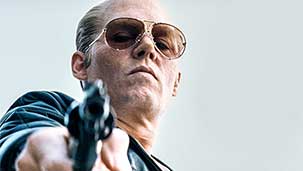Both of you have been in the dialect game for a long time. Lots of experience making British actors sound American and American actors sound British. And both of you previously worked with Johnny Depp on the Pirates of the Caribbean films, helping him perfect his boozy, burnt-out, Keith Richards slur. But in the Whitey Bulger biopic Black Mass, you tackle the ever-elusive Boston “Southie” accent. And your actors do an admirable job (or jahb) adding another layer to help the film achieve its high standard of authenticity. And the film is authentic. Almost to a fault.
Early in Black Mass, one of the characters tells us that Southie kids would play “cahps an rahbbehs,” and then grow up to become them. James “Whitey” Bulger is probably the most notorious of them all; as leader of the violent Winter Hill Gang, Bulger and his crew were responsible for running a lucrative and bloody crime racket from the 70s to the late 90s. In 1975, Bulger entered into an unholy alliance with John Connolly, a childhood friend turned FBI agent, and Black Mass documents their mutually-beneficial union from its nascence to its humiliating downfall twenty years later.
Luckily for you, your clients are some of the most talented actors working today: Joel Edgerton, Benedict Cumberbatch, Kevin Bacon, Jesse Plemons, Rory Cochrane, W. Earl Brown, (deep breath), Adam Scott, David Harbour, Corey Stoll, Dakota Johnson, Julianne Nicholson, and, of course, the Master of Disguise himself, Johnny Depp.
All these actors are committed to a veracity that obviously comes from the top down. Director Scott Cooper recreates the world of South Boston in the 70s, and lets them play in it. By doing so, he grounds the film in reality. There is no shaky hand-held camera work, no overly saturated colour correction, no fussy editing. From the cars to the costumes to the coiffes, Black Mass is not a nostalgia trip, it’s a time capsule.
Maybe that’s why at times I felt like I was watching the most expensive America’s Most Wanted re-enactment ever.
Black Mass borrows from a lot of other classic American gangster movies, but it lacks an essential element that those other films possess: heart. It’s near impossible to make a memorable gangster movie without glamourizing some aspect of the crime world, and that’s usually part of the appeal. But Black Mass refuses to do so. It doesn’t give us anyone to root for, which makes it difficult to get truly invested in where the characters end up. As good as your coaching was, I always knew I was watching a movie. I didn’t once get lost in the story the way I get lost when I watch other true-crime dramas like Goodfellas, or Casino, or Donnie Brasco. And the reason I enjoy re-watching those films is that, despite their grim subject matter, they all have stand-out moments that excite me—be it dialogue, or music, or slick camera-work.
What Black Mass lacks in big cinematic moments, it makes up for with Depp. Or tries to, at least.
Depp as Bulger is absolutely electric. After adjusting to the fact that he looks like a weird hybrid of his Mad Hatter and Raoul Duke characters, Depp’s portrayal of the charming, psychopathic, egomaniacal crime boss is exactly what we’ve come to expect from him. He’s smooth and scary, and we never know when he’s going to snap. He provides the film with its only real tension. When he isn’t on screen he is missed.
It’s difficult to pinpoint exactly what makes a good crime/gangster movie great. It’s a combination of memorable characters, solid acting, and a thrilling narrative. Black Mass has some of these qualities, but never all of them at the same time. Bulger starts out bad, stays bad. Connolly starts out slimy and gets slimier. Bulger’s homicidal henchmen are only remorseful when they realize the jig is up. The female characters, though exceptionally portrayed, are background nags. Besides Depp, the lone bright spot is the deliciously twitchy cokehead played by Peter Sarsgaard. Or, as Connelly calls him: “a coke-snahtin piece ah shit,” Some might pick at the inconsistencies of a faux-Southie accent, but as a former bartender I can tell you, Sarsgaard’s sweaty, powder-hound paranoia is something I’ve seen too often, and his is the perfect mix of funny and pathetic.
Perhaps it’s because we know the outcome of the story before we even hear the first mutton-chopped bad guy say, “you’re breakin’ my fahckin’ hath!” that it’s difficult to sustain any suspense. Cooper’s reluctance to glorify Bulger is understandable, but the narrative reads like it came from the desk of a true-crime reporter: lots of players, lots of murders, but not a whole lot of thrills. Don’t misunderstand, I applaud your attention to detail. If you’re going to make a movie set in South Boston you have to “go hahd or go home”, or else the locals will take you to task. But by being too married to authenticity, Black Mass fails to be cinematic in the way a classic gangster movie should be. Even Johnny Depp will tell you: a little fugazi goes a long way.
Regahds,
Di







